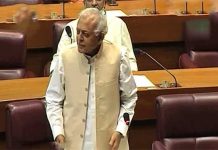KARACHI: Council of P
akistan Newspaper Editors (CPNE) has welcomed the r
ecommendat
ion of the government that ‘Dawn Leaks’ issue should be given to All P
akistan Newspapers Society (APNS).
Justice (r) Amir Raza Khan had headed the ‘Dawn Leak’ inquiry commission.
In a joint statement, CPNE President Zia Shahid and Secretary General Ejaz-ul-Haq, however, contended that the All P
akistan Newspapers Society (APNS) was also of our fraternity, but there was a technical fault and CPNE drew the attent
ion of the Ministry of Information that the APNS was an organisat
ion of newspapers owners and publishers.
What appears in the newspaper is purely related to the newspaper editor, who supervises the specifics of newspaper and stands responsible for it.
Therefore, with all respect, r
ecommending APNS as the body by Justice Raza on this matter does not come within the sphere of APNS. “What appears in a newspaper or what action to be taken purely falls in the boundary of CPNE”, they maintained.
It should have been considered that a committee to be formed on matter of Dawn Leaks through nominations of three/four members from CPNE and APNS or designated representatives by these two bodies to initiate the process of investigation and further action in this respect.
We also invite attent
ion of ministries of Interior and Information on the remarks of Justice (r) Raza in which respected justice r
ecommended in his report that CPNE to formulate code of conduct.
Senior members of APNS are well versed about the reconditions of CPNE and APNS members, who have shaped the code of conduct for newspapers during their one and a half year visits to Information Ministry in Islamabad during the tenure of President Pervez Musharraf. Even the then Information Ministry after detailed deliberations and pondering into the draft of the document had approved the code of conduct. In the last meeting an official of Federal Law Ministry had also been invited to bring in corrections in the light of prescribed laws.
Even in absence of any federal information minister, the then secretary Information, Anwer Mahmood not only participated in the meetings but he with his team had commended the code of conduct.
Not only is this document still workable but Press Council of P
akistan used to consult this document for giving consent on such particular segment.
They informed that the code of conduct for newspapers was still being used and even the Press Council of P
akistan i
s getting directions from this document.
Th
e commission should have referred the Dawn Leaks matter to the CPNE rather than to APNS.
They asked the federal ministries of interior, information and law not to consider the code of conduct ‘proscribe’ in the light of r
ecommendat
ion of th
e commission on Dawn Leak.
In case the code of conduct practice is even repeated today, these ministries would have to invite and hand over this responsibility to CPNE and APNS collective members.
